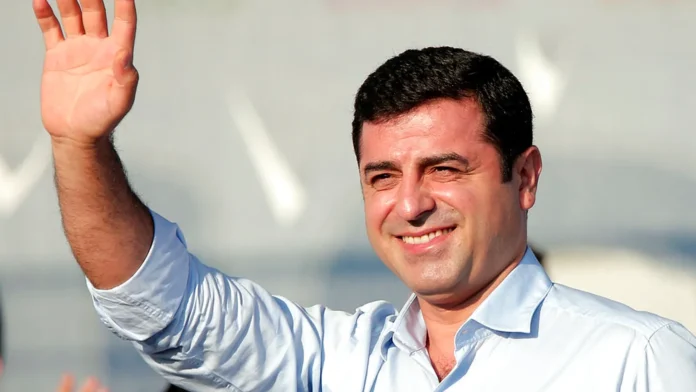Jailed Kurdish politician Selahattin Demirtaş has denied claims made by former parliament speaker Bülent Arınç implying that he had softened his stance toward President Recep Tayyip Erdoğan, saying he entered prison with honor and will leave it with honor, Turkish Minute reported.
Demirtaş, 52, a former co-chair of the pro-Kurdish Peoples’ Democratic Party (HDP), was arrested on November 4, 2016, on “terrorism-related” charges as part of a government crackdown on opposition figures. Once one of Turkey’s most prominent political voices, he remains widely regarded in Western capitals as a political prisoner.
The politician issued a statement on Thursday after Arınç publicly recounted a recent visit to Edirne Prison in northwestern Turkey and alleged that Demirtaş no longer sought political office and wanted a meeting with Erdoğan.
“From now on I will not consider candidacy or politics, but I want to promise that I will do whatever I can for my country,” Arınç quoted him as saying.
Demirtaş said the remarks attributed to him were false.
In a handwritten message posted on social media through his lawyers, Demirtaş said some statements he had never made were being circulated as if they came from him.
“From now on, except for my own friends, I will not meet with politicians or lawyers,” he said. “I ask for your understanding.”
Demirtaş described the hardest part of his nine years in detention as seeing words he never spoke publicly portrayed as his own.
“I entered here with my honor and head held high,” he said. “I will leave with my honor, or I will stay here until the last day of my life. There is no alternative for me.”
Demirtaş was an outspoken critic of Turkey’s ruling Justice and Development Party (AKP) and its leader, Erdoğan, before he was jailed. He ran in the 2014 and 2018 presidential elections as a rival to Erdoğan. The imprisoned leader conducted his election campaign from jail for the 2018 polls.
He said no one has the authority to speak on his behalf, even with good intentions.
“Any statement, comment or thought that I have not directly shared does not bind me,” he said. “I am deeply troubled by distorted or fabricated remarks being attributed to me.”
The former HDP leader has been imprisoned since 2016 despite repeated European Court of Human Rights (ECtHR) rulings calling for his release.
The latest controversy comes amid renewed expectations of Demirtaş’s possible release in line with the latest ruling from the ECtHR and ongoing talks between the outlawed Kurdistan Workers’ Party (PKK) and the Turkish government to end the decades-long PKK armed campaign.
Earlier this month the ECtHR rejected Ankara’s final appeal and finalized its previous ruling calling for Demirtaş’s immediate release.
There are also heightened hopes about the release of Demirtaş and other jailed Kurdish politicians as part of peace efforts with the PKK, as a result of which the PKK in May announced its decision to lay down its arms and dissolve itself.
In return Kurds are expecting concrete steps from the Turkish government addressing the longstanding demands of the country’s Kurds for the expansion of their cultural and political rights, the reintegration of former PKK militants into society and the release of Kurdish politicians from jail.
MHP calls for Demirtaş’s release
The far-right Nationalist Movement Party (MHP), whose leader, Devlet Bahçeli, an ally of President Erdoğan, unexpectedly launched the peace process with the PKK in October 2024, also supports Demirtaş’s release from prison.
Bahçeli, who has long been a fierce critic of Demirtaş and has at times labeled him a “terrorist” over alleged links to the PKK, said after the ECtHR ruling that Demirtaş’s release would be “beneficial for Turkey.”
The party’s deputy chairman, Feti Yıldız, echoed that position in a statement on X on Thursday, urging judges and prosecutors to implement the ECtHR decision on Demirtaş.
Yıldız said that if an ECtHR judgment finds a violation caused by detention, “the violation can end only by releasing the detainee; there is no other option,” adding that petitions filed by detainees to lift such violations must be examined “within a reasonable time, a period that cannot be arbitrary.”
In May 2024 Demirtaş was sentenced to over 40 years in prison for allegedly inciting violence during the 2014 Kobani protests, in which 37 people were killed. He had previously received a two-year sentence in 2021 for allegedly “insulting the president.”
The ECtHR has now ruled three times — in 2018, 2020 and 2025 — that Demirtaş’s detention violated his rights, concluding that Turkish authorities aimed to silence political opposition. The latest ruling ordered Ankara to pay over €55,000 in damages and legal fees.















